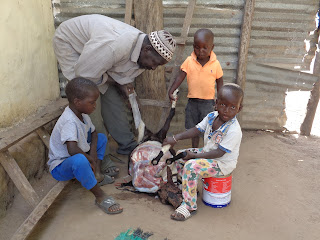A Glimpse of My Future
Last week I visited the village where I will be living for my two-year PC service. It's a village of about 300-400 people on the north side of the river, about 30k east of Barra (across the river from Banjul). It was a great visit and I'm very excited to return in mid December and get to work.
 |
| Following my host father to the groundnut fields. |
Many
of the people in the village belong to the Seerer tribe, a group that
historically focused on fishing but these days is more likely to be involved with farming.
Indeed, this is a farming village. I was there during the final days of the
groundnut harvest; cashews are the next crop in the pipeline, with harvest
starting in Dec/Jan. I have yet to learn what other crops they tend.
They
also have a sizeable women’s garden. The garden used to provide a bounty of fresh
vegetables for the village but the fencing surrounding it needs significant
repairs, causing it to be useful for little other than growing millet because they
can’t keep goats and other free range livestock out. This may be one project I work on
while I’m there. Another priority for the village is securing another source of
potable water. They have multiple wells that can be used for washing and
watering, but only one – a covered hand pump – that accesses water that is safe
to drink. If something happens to the pump they are out of luck. This could be
another project.
But
our reason for visiting the site wasn’t to identify projects, it was to meet
our host family, be introduced to the village elders, Imam and other community
members, and see our new digs. Keeping with tradition, I brought kola nuts for
my host father, the elders and Imam. Kola nuts are not very expensive but have
great value. They are an important part of many ceremonies and celebrations. A
gift of kola nuts from a visitor is a sign of respect and appreciation, and begets
the acceptance and protection of those who receive them. I’d add hospitality to
that list but hospitality is a given in this country, no kola nuts required.
Kunda
Ndure is my new home. Kunda means compound and Ndure is my host father’s
surname. I’ll be adopting that surname when I arrive in village, so my name
will change to Bakoto Ndure.
There
are four married couples in my compound and each has a few kids, for a total
population of about 30. All of the couples in my compound include a husband with
one wife. Polygamy is common among the Muslim population; the Koran allows men
to have up to four wives. But plenty of men choose to have only one wife. From
a distance – I know, because I used to be distant – it’s easy to view polygamy as
an objectionable practice. But when viewed close up it isn’t necessarily the
case. In Gambian culture, child brides are a rarity and women are able to
choose who they marry. They can also divorce. Having more women in the compound
means more helping hands to do all of the work – yes, gender roles are very
ingrained and the women and girls are responsible for almost all of the
cooking, cleaning, childcare and gardening. Multiple mothers means that childcare
can be provided for women who have jobs. But it also means more mouths to feed
and other resources needed, which gets harder and harder as the culture shifts
to one where people have more expenses (school books/uniforms, cell phones,
etc.) and are less able to meet their needs without cash in hand.
 |
| Kids having breakfast before heading to school. |
 |
| My baay (father) and yaay (mother) |




Comments
Post a Comment